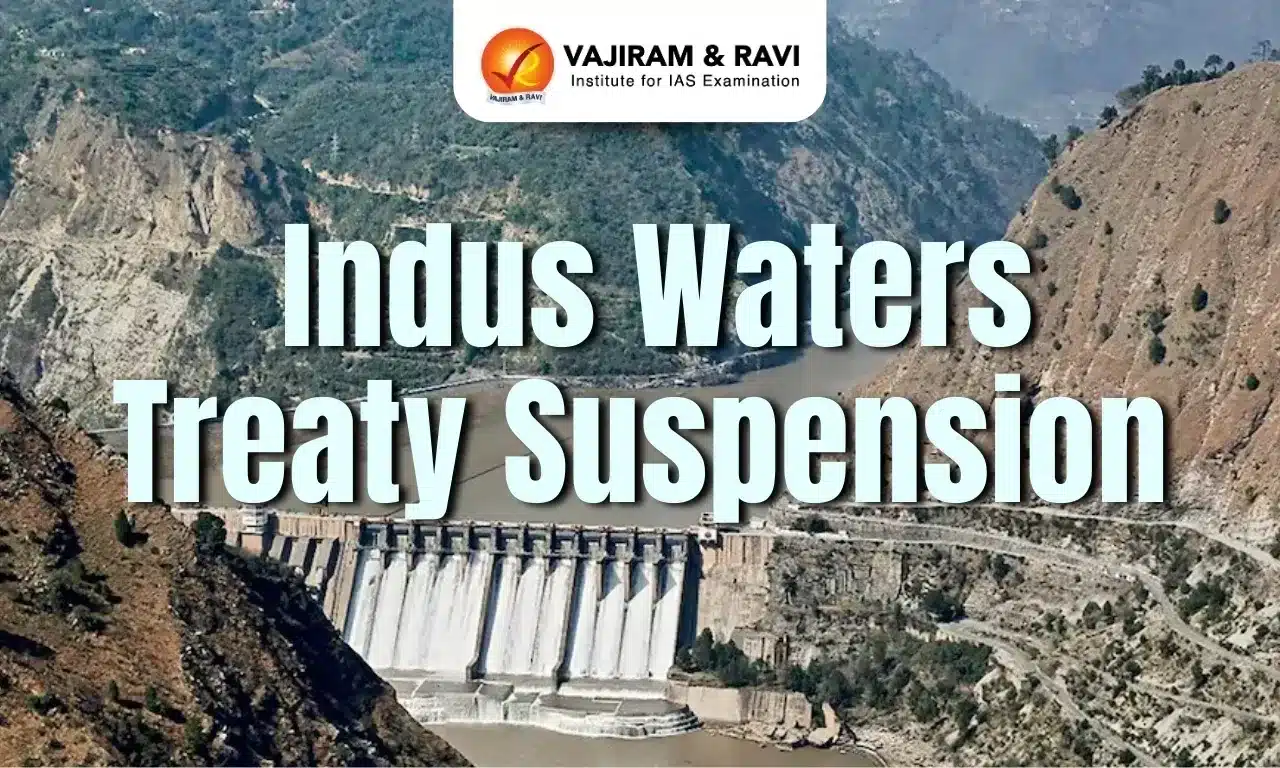What’s in Today’s Article?
- Indus Waters Treaty Suspension Latest News
- Indus Waters Treaty: Historical Resilience and Recent Strains
- Legal Framework and Limitations of the Indus Waters Treaty (IWT)
- Implications of Suspending the Indus Waters Treaty (IWT)
- Suspension is Devastating for Pakistan
- Indus Waters Treaty Suspension FAQs
Indus Waters Treaty Suspension Latest News
- India has decided to suspend the Indus Waters Treaty (IWT) of 1960 with immediate effect, following a deadly terror attack in Pahalgam that killed at least 26 people. The treaty will remain in abeyance until Pakistan credibly and permanently ends its support for cross-border terrorism.
- The decision was made during a Cabinet Committee on Security (CCS) meeting chaired by Prime Minister Narendra Modi.
Indus Waters Treaty: Historical Resilience and Recent Strains
- The IWT, signed in 1960, governs water sharing between India and Pakistan, granting India control over eastern rivers and Pakistan over western rivers.
- It withstood multiple wars between India and Pakistan and has never been suspended — not even after the 2016 Uri attack that killed 18 Indian soldiers, despite calls for its revocation.
Rising Tensions and India’s Push for Modification
- Since early 2023, India has escalated efforts to revisit the treaty:
- January 2023: India issued a notice to Pakistan seeking a “modification” of the IWT.
- September 2023: A second notice called for “review and modification,” which experts interpreted as a step toward revocation and renegotiation.
Reasons Cited by India for Renegotiation
- India argued for a reassessment of the treaty due to:
- Fundamental and unforeseen changes in circumstances.
- Shifting demographics and environmental challenges.
- Clean energy requirements tied to global emission goals.
- Continued cross-border terrorism from Pakistan.
Disputes over Hydroelectric Projects
- Pakistan objected to the design of two Indian “run-of-the-river” hydroelectric projects in Jammu & Kashmir:
- Kishanganga HEP (on the Kishanganga River)
- Ratle HEP (on the Chenab River)
- Despite not blocking river flow, Pakistan claimed these projects violate the IWT.
Suspension for the First Time
- Despite all previous tensions and provocations, the treaty was never suspended — until now, marking the first time one of the signatories (India) has formally moved to hold the treaty in abeyance.
Legal Framework and Limitations of the Indus Waters Treaty (IWT)
- No Exit Clause or End Date
- The IWT does not contain any provision for unilateral withdrawal or termination by either India or Pakistan.
- It is a perpetual treaty, with any modification requiring mutual consent.
- Dispute Resolution Mechanism
- Article IX, along with Annexures F and G, outlines a three-tiered dispute resolution process:
- Initial resolution through the Permanent Indus Commission
- Escalation to a neutral expert
- Final arbitration through a forum of arbitrators
- Article IX, along with Annexures F and G, outlines a three-tiered dispute resolution process:
- Limitations of Legal Recourse for Pakistan
- According to experts:
- If India revokes or suspends the treaty, the existing dispute resolution mechanism becomes ineffective, as it only applies to disputes within the treaty framework.
- There is no provision in the IWT for treaty revival or enforcement in case of suspension.
- Pakistan cannot appeal to the International Court of Justice (ICJ) due to India’s reservation under the ICJ statute, which bars such cases.
- According to experts:
- No Peaceful Mechanism for Enforcement
- In the event of India stepping outside the treaty framework, Pakistan may lack any peaceful legal route to compel India to resume adherence or implementation of the IWT.
Implications of Suspending the Indus Waters Treaty (IWT)
- Expanded Strategic Options for India
- By placing the IWT in abeyance, India gains greater autonomy over the use of the Indus River system, especially the Western Rivers—Indus, Jhelum, and Chenab.
- Cessation of Data Sharing
- India can stop sharing water flow data with Pakistan, which was a key requirement under the treaty for transparency and flood forecasting.
- Freedom from Design and Operational Constraints
- India is no longer bound by treaty-imposed restrictions on design and operations of hydroelectric projects on Western Rivers.
- Infrastructure and Water Management Opportunities
- New Storage Projects: India can now build storage reservoirs on the Western Rivers.
- Reservoir Flushing Allowed: India can implement reservoir flushing at sites like the Kishanganga Project, improving dam lifespan by clearing sediment.
- Suspension of Site Visits
- India can deny access to Pakistani officials seeking to inspect Indian hydro projects, which was earlier mandated under the treaty’s provisions.
- Limited Immediate Impact
- Despite these expanded powers, short-term impact is minimal because India currently lacks adequate infrastructure to halt or divert river flows effectively.
Suspension is Devastating for Pakistan
- Existential Dependence on the Indus System
- 80% of Pakistan’s cultivated land (16 million hectares) relies on this water.
- 93% of that water supports irrigation, sustaining agriculture—the country’s economic backbone.
- Over 237 million people live in the Indus Basin; Pakistan comprises 61% of this population.
- Urban and Energy Dependence
- Major cities like Karachi, Lahore, and Multan depend on Indus waters for daily needs.
- Key hydropower plants like Tarbela and Mangla rely on consistent flows.
- Economic and Agricultural Significance
- The Indus system contributes nearly 25% of Pakistan’s GDP.
- Supports key crops: wheat, rice, sugarcane, and cotton.
- Pakistan is among the most water-stressed countries, with rapidly declining per capita water availability.
Indus Waters Treaty Suspension FAQs
Q1. Why did India suspend the Indus Waters Treaty?
Ans. India suspended the treaty after a terror attack, blaming Pakistan for ongoing cross-border terrorism.
Q2. What rivers are affected by the Indus Waters Treaty suspension?
Ans. The suspension impacts Western Rivers: Indus, Jhelum, and Chenab, previously allocated to Pakistan.
Q3. Can Pakistan challenge the suspension legally?
Ans. No, the treaty lacks an exit clause and Pakistan can’t approach ICJ due to India’s reservations.
Q4. How does the suspension affect Pakistan’s agriculture?
Ans. Over 80% of Pakistan’s farmland depends on Indus waters, severely impacting food and economic security.
Q5. What benefits does India gain from suspending the treaty?
Ans. India can build storage, deny data sharing, and redesign hydro projects without treaty restrictions.
Last updated on February, 2026
→ UPSC Notification 2026 is now out on the official website at upsconline.nic.in.
→ UPSC IFoS Notification 2026 is now out on the official website at upsconline.nic.in.
→ UPSC Calendar 2026 has been released.
→ UPSC Final Result 2025 is expected to be released in the first week of March 2026.
→ Check out the latest UPSC Syllabus 2026 here.
→ Join Vajiram & Ravi’s Interview Guidance Programme for expert help to crack your final UPSC stage.
→ UPSC Mains Result 2025 is now out.
→ UPSC Prelims 2026 will be conducted on 24th May, 2026 & UPSC Mains 2026 will be conducted on 21st August 2026.
→ The UPSC Selection Process is of 3 stages-Prelims, Mains and Interview.
→ Prepare effectively with Vajiram & Ravi’s UPSC Prelims Test Series 2026 featuring full-length mock tests, detailed solutions, and performance analysis.
→ Enroll in Vajiram & Ravi’s UPSC Mains Test Series 2026 for structured answer writing practice, expert evaluation, and exam-oriented feedback.
→ Join Vajiram & Ravi’s Best UPSC Mentorship Program for personalized guidance, strategy planning, and one-to-one support from experienced mentors.
→ Check UPSC Marksheet 2024 Here.
→ UPSC Toppers List 2024 is released now. Shakti Dubey is UPSC AIR 1 2024 Topper.
→ Also check Best UPSC Coaching in India




















